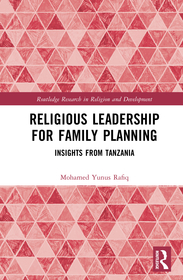
Religious Leadership for Family Planning
Insights from Tanzania
Series: Routledge Research in Religion and Development;
- Publisher's listprice GBP 145.00
-
69 273 Ft (65 975 Ft + 5% VAT)
The price is estimated because at the time of ordering we do not know what conversion rates will apply to HUF / product currency when the book arrives. In case HUF is weaker, the price increases slightly, in case HUF is stronger, the price goes lower slightly.
- Discount 10% (cc. 6 927 Ft off)
- Discounted price 62 346 Ft (59 378 Ft + 5% VAT)
Subcribe now and take benefit of a favourable price.
Subscribe
69 273 Ft

Availability
Not yet published.
Why don't you give exact delivery time?
Delivery time is estimated on our previous experiences. We give estimations only, because we order from outside Hungary, and the delivery time mainly depends on how quickly the publisher supplies the book. Faster or slower deliveries both happen, but we do our best to supply as quickly as possible.
Product details:
- Edition number 1
- Publisher Routledge
- Date of Publication 28 November 2025
- ISBN 9781041085362
- Binding Hardback
- No. of pages226 pages
- Size 234x156 mm
- Language English
- Illustrations 23 Illustrations, black & white; 23 Halftones, black & white 700
Categories
Short description:
Over the last thirty years, religious leaders in Tanzania have increasingly been recruited to participate in sensitive health programs like family planning. Providing an innovative and nuanced theorization of development, religion, and health, this will be an important read for researchers of African Studies, and of faith-based development.
MoreLong description:
Over the last thirty years, religious leaders in Tanzania have increasingly been recruited to participate in sensitive health programs like family planning. This book considers what happens when religious leaders, often envisaged as central to a project’s success, are unavailable.
Based on extensive ethnographic research, the book argues that in those situations, public health NGOs often create and co-opt religious leaders from religiously adjacent figures such as healers, marriage counsellors, and Quran teachers. These newly crafted religious leaders then in turn actively adapt and reshape their roles in ways that accommodate and sometimes diverge from the project's intentions. Challenging the conventional view of development as a linear process between developer and developee, this book reveals development as a layered and dynamic process shaped by intersecting visions and competing desires for spatio-temporal transformation. The book uses the Kiswahili concept kujiendeleza (‘to make oneself go’) to capture the awkward, unequal and creative connections between NGOs and the Muslim and Christian religious leaders they work with for the implementation of their plans. Far from being passive or disengaged, local actors actively engage with family planning and development projects in ways that reflect both their agency and the complexities of their socio-political contexts.
Providing an innovative and nuanced theorization of development, religion, and health, this book will be an important read for researchers of African Studies, and of faith-based development.
MoreTable of Contents:
Introduction Chapter 1: List from Afar Chapter 2: Peopling the List Chapter 3: Winning the Community Chapter 4: Schooling Religious Leaders Chapter 5: Of Science and Superstition Chapter 6: Selective Engagement Chapter 7: Uwepo, Spiritual Presence Conclusion
More



